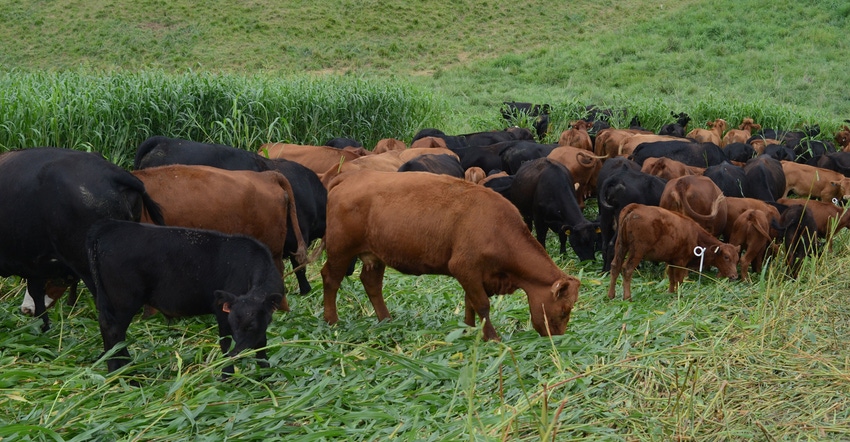July 26, 2021

Incorporating a summer annual into the crop rotation provides much-needed summer slump grazing while using minimal row crop acres. A winter annual-summer annual forage rotation disrupts the standard corn-soybean rotation, which provides several benefits, according to Denise Schwab, Iowa State University Extension beef specialist.
"This rotation provides agronomic benefits such as reduced pest pressure, ability to rotate herbicides, and helps scavenge soil nutrients, and it provides whole farm enterprise flexibility," she says. "It also provides feed during three critical seasons, when perennial pasture production is limited."
Schwab said several forage field days are planned that will demonstrate annual forage rotations and share the results of ISU research plots. There's no cost to attend, and you don't need to preregister for any of the events.
Three on-farm field days feature producers using annual forage rotation, and two field days at Iowa State University research and demonstration farms will feature annual forage plots as a part of the annual research farm field days.
On-farm field days in northeast Iowa are as follows.
Wednesday (July 28), 1 p.m., Prairie Creek Seed location, 21995 Fillmore Road, Cascade. Karl Dallefeld from Prairie Creek Seed will discuss annual forage traits and species selection, and Schwab will discuss using annual forages in beef operations and the economics of an annual forage system. Attendees will then tour the Nathan Manternach farm at 23476 Highway 136, Cascade. Manternach has used both winter and summer annual forages in his grazing rotation for several years.
Sept 2, 6 p.m. Nathan Goedken's farm, 1902 310th Ave., Dyersville. Goedken baled winter annual forages in June and then drilled a mix of summer annuals. He plans to graze with fall-calving cows and stockpile late-season growth for winter grazing.
Date and start time to be determined. Jason Wells farm, 14658 252nd St, Milton. Wells grazes a mix of summer annuals. Details on date and starting time are still be coordinated and will be announced when available.
ISU demonstration and research farm field days are as follows.
Aug. 3, 3:30 p.m., McNay Research Farm, 45249 170th Ave., Chariton. The annual summer field day includes dinner and also features other beef cattle research at the farm. This event highlights the annual forage plots at the farm that include five summer annuals, and also looks at the impact of nitrogen on forage production. This is following five winter annual forages with two nitrogen treatments as well.
Aug 27, 1 p.m., Northeast Research Farm, 3321 290th St., Nashua. One of the stops will highlight the annual forage plots at this farm, which includes four summer annuals with two nitrogen treatments following winter annual forages.
Plan to attend one or more of these field days to learn about the selection, production and economics of an annual forage rotation to determine whether it might work for your operation. For more information, contact Schwab at [email protected] or 319-721-6343.
Source: Iowa Beef Center, which is responsible for the information provided and is wholly owned by the source. Informa Business Media and its subsidiaries aren't responsible for any of the content contained in this information asset.
You May Also Like




